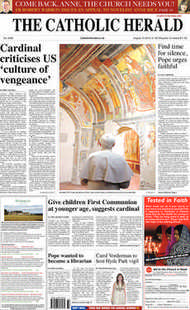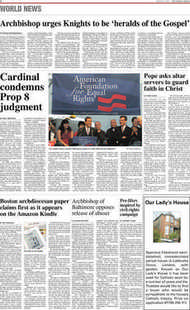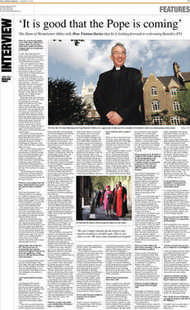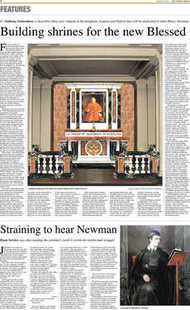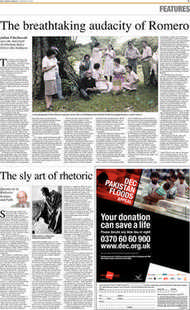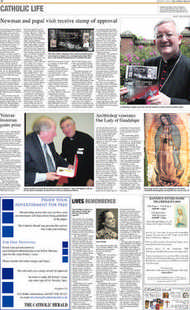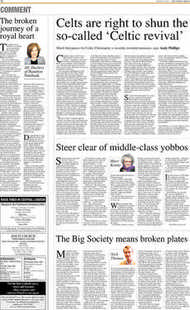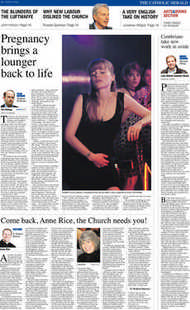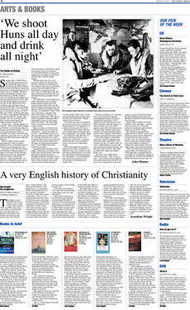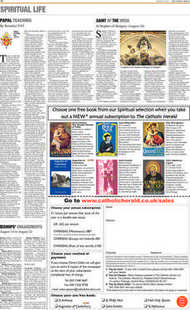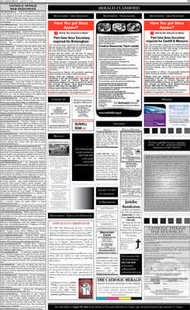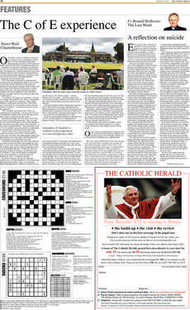Page 12, 13th August 2010
Page 12

Report an error
Noticed an error on this page?If you've noticed an error in this article please click here to report it.
Tags
Share
Related articles
Beyond The Fringe
Celtic Spirituality Was About Sacraments, Not...
The Early Church In England
Faith's Debt
The Celtic Revolution By Simon Young (gibson Square,...
Celts are right to shun the so-called ‘Celtic revival’
Much that passes for Celtic Christianity is recently invented nonsense, says Andy Phillips
Christians today seem to just adore books with the word “Celtic” in the title, with some Christian bookshops having a shelf or two labelled “Celtic Christianity”, the term referring to the ancient faith of early Celtic Christians but also to its modern expression.
Yet it can seem sometimes as if just about anything can be called “Celtic” these days, the word now effectively becoming interchangeable with the word “alternative” because of enthusiastic and indiscriminate misuse. Some “Celtic” prayer books, for example, include prayers of native North American Indians. One has contributions from writers in the “Celtic tradition” such as Thomas Merton, C S Lewis and Ignatius Loyola. Yet another has a prayer celebrating genitalia and libido. We are treated in one book to a “Celtic” liturgy for use after a terrorist outrage, in another a chapter about King Arthur amid those about Celtic saints. Some of these books are even totally devoid of anything that could be remotely defined as “Celtic”, but they are popular and sell if the word “Celtic” is in the title, and sales are what has driven this “tradition” forward, even if the credibility of publishers is looking increasingly questionable as this “tradition” descends into farce.
But this “Celtic” Christian spiritual tradition is in reality only a generation old at most as it has no connectivity with the authentic and ancient one that ended with the Norman Conquest. It is the modern invention of mainly English Anglican enthusiasts who do not speak a Celtic language, who write books of dubious academic merit, and whose involvement with Celtic holy places and their people is usually little more than a day trip to Iona. Some speak ridiculously of “Celtic” Northumbria, where this new tradition has its focus, despite it having no living Celtic language, a dearth of Celtic place names, and the mission of Irish monks there from Iona led by Aidan lasting a mere 29 years until their ignominious retreat after the Synod of Whitby put an end to Celtic practices in 664.
Such so-called Celtic experts sometimes write something in a book or on the internet that they would like to be true, only to see it get passed on and conveniently absorbed by a gullible public as a definite fact. One Celtic Christianity enthusiast I met firmly told me that Celtic lay abbots used to ordain clergy and also that women were ordained. Then there was another who said that early Celtic Christians worshipped God as mother, but was unable to cite any supporting original Celtic source. The reality is that there is much invented nonsense now swirling about in today’s “Celtic” Christianity.
One should not be surprised from all this that the fiercest critics of this increasingly bizarre phenomenon come from the more knowledgeable Celts living in those places that still speak a Celtic language: Scotland, Wales, Brittany, Ireland, Cornwall and the Isle of Man. One Gaelicspeaking Scottish professor sarcastically remarked that Celtic spirituality enthusiasts should go and live alone on top of the Old Man of Hoy if they are that serious about following their spiritual path. For Celtic saints invariably lived extremely ascetic lives of great austerity, often living alone for a time as hermits in the cold and rain. Other things which are almost invari ably glossed over or ignored are that they were invariably celibate, they did not ordain women, they were deeply penitential, they venerated the Blessed Virgin Mary, they tenaciously clung on to received dogma and they deferred to Rome in matters of faith. These were thoroughly Catholic Christians, albeit with an Orthodox tinge, but they were certainly not proto-Protestants or early Anglicans, as some would have us believe.
The question now is: how long can this “Celtic” bandwagon keep rolling? And what of value will be lost when this growing bubble of spiritual hubris bursts one day, as surely it must? This will be a great tragedy as there is much to be gained from learning about the lives of Celtic saints and the seriousness of the faith they professed.
So can Celtic Christianity be saved, and how might it best be done? What might a more authentic modern expression of Celtic Christianity look like? It would be deeply penitential, taking sin much more seriously. It would be ascetic, with a great emphasis on selfsacrifice and fasting. It would involve silence and isolation. Significant time would be spent outdoors, not just on pleasant walks, but enduring the cold and damp. Higher status would be accorded to the Blessed Virgin Mary and the communion of saints. Celtic languages would be used whose nuances can shed light upon past spirituality. It would be deeply mystical with a genuine understanding of sacramentality as one cannot understand Creation as sacrament without it; it would involve quietly meditating upon the Psalms so beloved by Celtic saints, rather than writing complex, wordy and sometimes tasteless “Celtic” prayers and liturgies.
It should be understood from this that Catholic and Orthodox monasticism is far, far closer in ethos to early Celtic Christianity than the variety we have seen focused on Anglo-Saxon Northumbria. The current “Celtic” revival was fatally and inevitably flawed from the outset as it was born in entirely the wrong place: within Northumbrian English liberal Protestantism. One can but wonder how much more integrity it would have had if it had been within Irish, Hebridean or Welsh Catholicism.
That today’s Celts and Catholics have given this new ersatz tradition a stiff ignoring is unsurprising, but it is becoming too daft and diffuse for us to dismiss any longer. While we may wish such silliness away, it will not pass quickly without positive action. We need to reclaim our spiritual heritage by learning about it and celebrating it more enthusiastically. This is our heritage we are talking about after all.
Reclaiming our precious spiritual heritage to protect it from further misuse won’t be easy, but there is no real alternative now. While the Celtic revival may have started well, it is now time for Celts and Catholics to work together to bring a fast-deteriorating “Celtic” movement to an end. For only then will we be able to give birth to something more noble, enduring and beautiful.
Andy Phillips is a Cornish Anglican priest and is the author of An Forth Keltek: a spiritual pilgrimage with the Celtic saints of Wales, Cornwall and Brittany, published by Spyrys a Gernow
blog comments powered by Disqus


